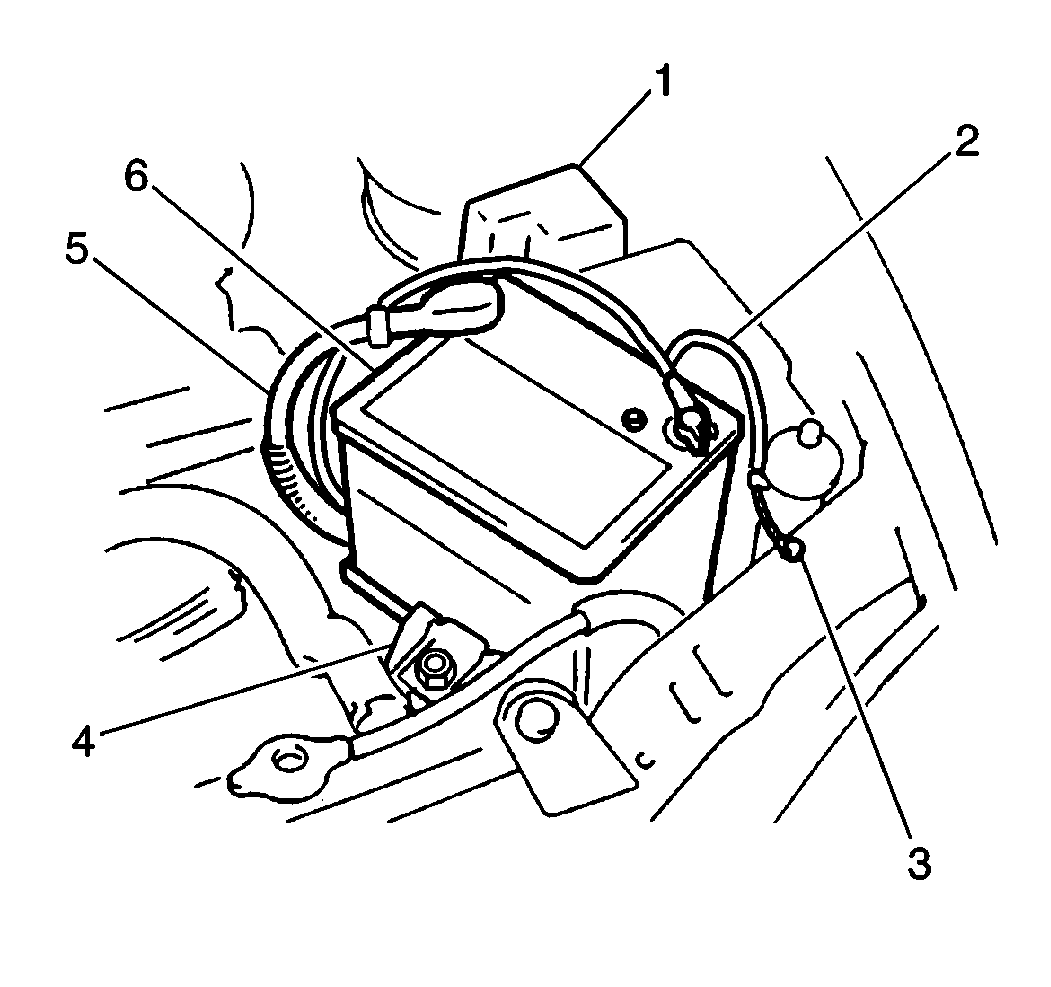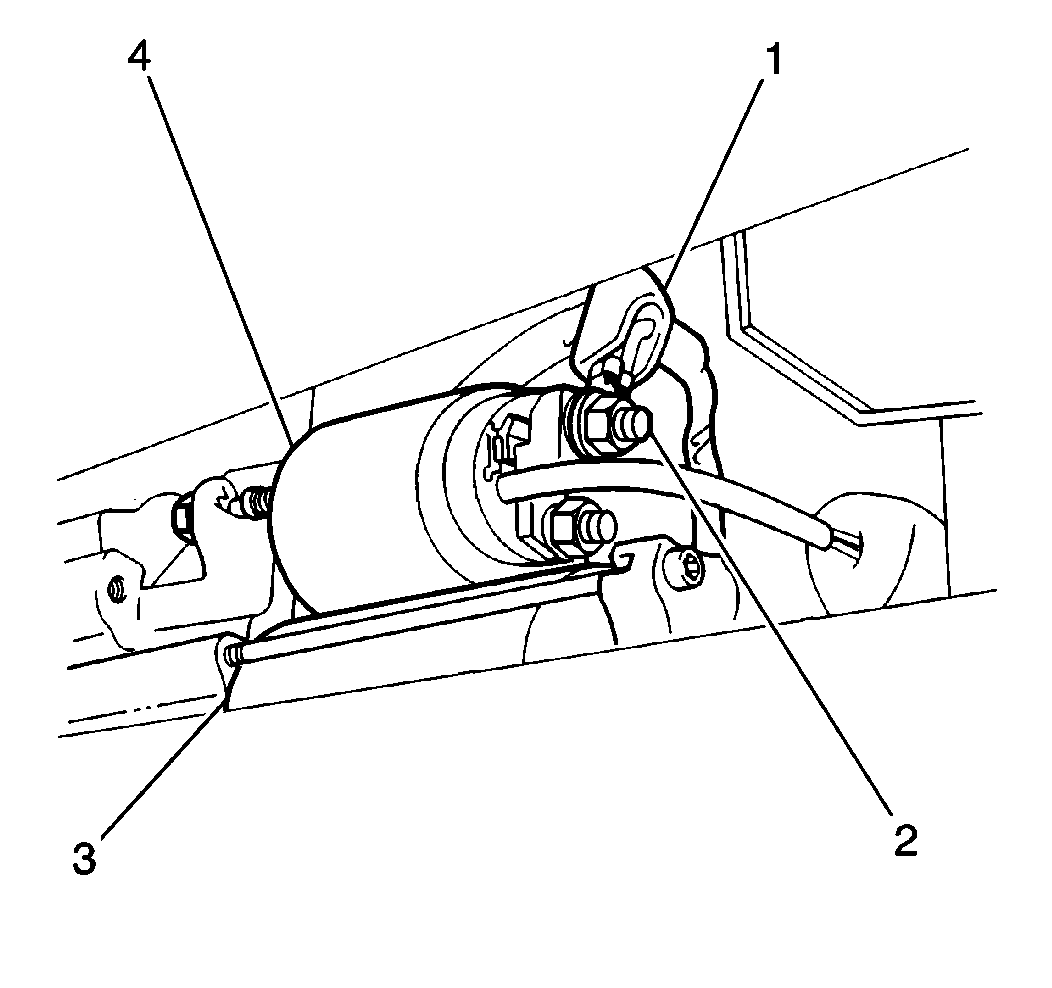Negative Battery Cable Removal Procedure
- Disconnect the negative (-) battery cable.
- Remove the ground bolt (3) and the negative (-) battery cable from the body.
- Remove the ground bolt and the cable from the transaxle.
- Remove the cable from the harness hold down on the battery carrier and remove the cable from the vehicle.
Caution: Unless directed otherwise, the ignition and start switch must be in the OFF or LOCK position, and all electrical loads must be OFF before servicing any electrical component. Disconnect the negative battery cable to prevent an electrical spark should a tool or equipment come in contact with an exposed electrical terminal. Failure to follow these precautions may result in personal injury and/or damage to the vehicle or its components.
Important: Whenever battery cables are being replaced, always be certain to use a replacement cable that is the same type, size and length. Some positive (+) cables have additional feed wires attached to them and some negative (-) cables have additional ground leads attached. Always be certain to route the replacement battery cable in exactly the same manner as the original cable.

Negative Battery Cable Installation Procedure
- Position the negative (-) battery cable into the vehicle.
- Connect the cable to the transaxle. Secure with the ground bolt.
- Connect the cable to the body. Secure with the ground bolt (3).
- Route the cable and secure it in the harness hold down on the battery carrier.
- Connect the negative (-) battery cable.

Notice: Use the correct fastener in the correct location. Replacement fasteners must be the correct part number for that application. Fasteners requiring replacement or fasteners requiring the use of thread locking compound or sealant are identified in the service procedure. Do not use paints, lubricants, or corrosion inhibitors on fasteners or fastener joint surfaces unless specified. These coatings affect fastener torque and joint clamping force and may damage the fastener. Use the correct tightening sequence and specifications when installing fasteners in order to avoid damage to parts and systems.
Tighten
| • | Tighten the manual transaxle ground bolt to 23 N·m (17 lb ft) |
| • | Install the automatic transaxle ground bolt to 50 N·m (37 lb ft) |
Tighten
Tighten the body ground bolt to 8 N·m (71 lb in)
Tighten
Tighten the negative (-) battery cable to 15 N·m
(11 lb ft).
Positive Battery Cable Removal
- Disconnect the negative (-) battery cable.
- Remove the positive (+) battery cable (5) from the battery.
- Remove the positive (+) battery cable from the bottom of the fuse and relay box (1).
- Remove the positive (+) battery cable from the generator.
- Remove the retaining nut and cable (2) from the starter solenoid.
- Remove the cable from the harness hold downs and remove the cable.
Caution: Unless directed otherwise, the ignition and start switch must be in the OFF or LOCK position, and all electrical loads must be OFF before servicing any electrical component. Disconnect the negative battery cable to prevent an electrical spark should a tool or equipment come in contact with an exposed electrical terminal. Failure to follow these precautions may result in personal injury and/or damage to the vehicle or its components.


Positive Battery Cable Installation
- Position the positive (+) battery cable (1) into the vehicle.
- Connect the cable to the starter solenoid (2). Secure the cable with a retaining nut.
- Connect the positive (+) battery cable to the generator.
- Connect the cable (5) to the fuse and relay box.
- Route the cable and secure it with the harness hold downs.
- Connect the negative (-) battery cable.

Notice: Use the correct fastener in the correct location. Replacement fasteners must be the correct part number for that application. Fasteners requiring replacement or fasteners requiring the use of thread locking compound or sealant are identified in the service procedure. Do not use paints, lubricants, or corrosion inhibitors on fasteners or fastener joint surfaces unless specified. These coatings affect fastener torque and joint clamping force and may damage the fastener. Use the correct tightening sequence and specifications when installing fasteners in order to avoid damage to parts and systems.
Tighten
Tighten the positive (+) battery cable-to-starter solenoid retaining
nut to 7 N·m (62 lb in).

